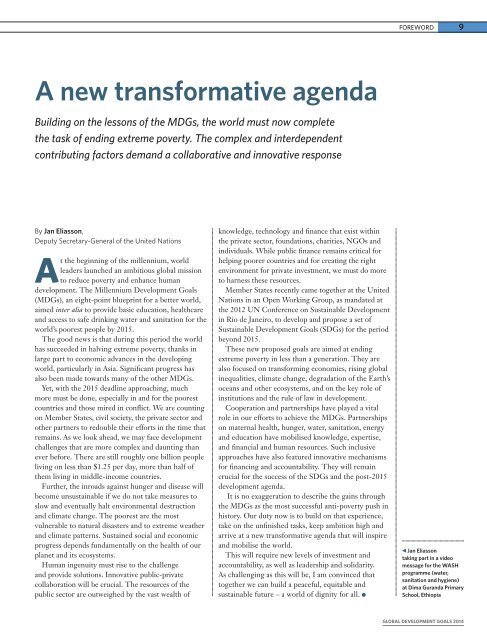FAMBB
FAMBB
FAMBB
Create successful ePaper yourself
Turn your PDF publications into a flip-book with our unique Google optimized e-Paper software.
FOREWORD9A new transformative agendaBuilding on the lessons of the MDGs, the world must now completethe task of ending extreme poverty. The complex and interdependentcontributing factors demand a collaborative and innovative responseBy Jan Eliasson,Deputy Secretary-General of the United NationsAt the beginning of the millennium, worldleaders launched an ambitious global missionto reduce poverty and enhance humandevelopment. The Millennium Development Goals(MDGs), an eight-point blueprint for a better world,aimed inter alia to provide basic education, healthcareand access to safe drinking water and sanitation for theworld’s poorest people by 2015.The good news is that during this period the worldhas succeeded in halving extreme poverty, thanks inlarge part to economic advances in the developingworld, particularly in Asia. Significant progress hasalso been made towards many of the other MDGs.Yet, with the 2015 deadline approaching, muchmore must be done, especially in and for the poorestcountries and those mired in conflict. We are countingon Member States, civil society, the private sector andother partners to redouble their efforts in the time thatremains. As we look ahead, we may face developmentchallenges that are more complex and daunting thanever before. There are still roughly one billion peopleliving on less than $1.25 per day, more than half ofthem living in middle-income countries.Further, the inroads against hunger and disease willbecome unsustainable if we do not take measures toslow and eventually halt environmental destructionand climate change. The poorest are the mostvulnerable to natural disasters and to extreme weatherand climate patterns. Sustained social and economicprogress depends fundamentally on the health of ourplanet and its ecosystems.Human ingenuity must rise to the challengeand provide solutions. Innovative public-privatecollaboration will be crucial. The resources of thepublic sector are outweighed by the vast wealth ofknowledge, technology and finance that exist withinthe private sector, foundations, charities, NGOs andindividuals. While public finance remains critical forhelping poorer countries and for creating the rightenvironment for private investment, we must do moreto harness these resources.Member States recently came together at the UnitedNations in an Open Working Group, as mandated atthe 2012 UN Conference on Sustainable Developmentin Rio de Janeiro, to develop and propose a set ofSustainable Development Goals (SDGs) for the periodbeyond 2015.These new proposed goals are aimed at endingextreme poverty in less than a generation. They arealso focused on transforming economies, rising globalinequalities, climate change, degradation of the Earth’soceans and other ecosystems, and on the key role ofinstitutions and the rule of law in development.Cooperation and partnerships have played a vitalrole in our efforts to achieve the MDGs. Partnershipson maternal health, hunger, water, sanitation, energyand education have mobilised knowledge, expertise,and financial and human resources. Such inclusiveapproaches have also featured innovative mechanismsfor financing and accountability. They will remaincrucial for the success of the SDGs and the post-2015development agenda.It is no exaggeration to describe the gains throughthe MDGs as the most successful anti-poverty push inhistory. Our duty now is to build on that experience,take on the unfinished tasks, keep ambition high andarrive at a new transformative agenda that will inspireand mobilise the world.This will require new levels of investment andaccountability, as well as leadership and solidarity.As challenging as this will be, I am convinced thattogether we can build a peaceful, equitable andsustainable future – a world of dignity for all.Jan Eliassontaking part in a videomessage for the WASHprogramme (water,sanitation and hygiene)at Dima Guranda PrimarySchool, EthiopiaGLOBAL DEVELOPMENT GOALS 2014


